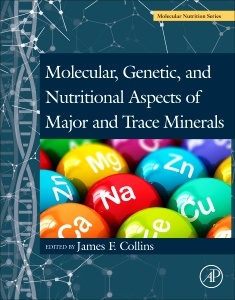Molecular, Genetic, and Nutritional Aspects of Major and Trace Minerals
Coordonnateur : Collins James F

Molecular, Genetic, and Nutritional Aspects of Major and Trace Minerals is a unique reference that provides a complete overview of the non-vitamin micronutrients, including calcium, copper, iodine, iron, magnesium, manganese, molybdenum, phosphorus, potassium, selenium, sodium, and zinc.
In addition, the book covers the nutritional and toxicological properties of nonessential minerals chromium, fluoride and boron, and silicon and vanadium, as well as ultra-trace minerals and those with no established dietary requirement for humans. Users will find in-depth chapters on each essential mineral and mineral metabolism, along with discussions of dietary recommendations in the United States and around the world.
Part I. Calcium 1. Calcium-Sensing Receptor Polymorphisms and Human Disease 2. Molecular Aspects of the Calcium-Sensing Receptor and Calcium Homeostasis 3. New Developments in Our Understanding of the Regulation of Calcium Homeostasis by Vitamin D 4. Calcium in Obesity and Related Diseases: The Calcium-Sensing Receptor as a Novel Mediator 5. Calcium: Basic Nutritional Aspects 6. Molecular Aspects of Calcium and Bone Mineralization
Part II. Copper 7. Copper: Basic Physiological and Nutritional Aspects 8. Copper and Molecular Aspects of Cell Signaling 9. Copper and Hypoxia-Inducible Transcription Factor Regulation of Gene Expression 10. Copper in Wilson’s and Alzheimer’s Diseases, Copper-Lowering Therapy in Cancer and Other Diseases, and Copper Deficiency
Part III. Iodine 11. Iodine: Basic Nutritional Aspects 12. Iodine and Thyroid Hormone Synthesis, Metabolism, and Action 13. Iodine and Adipocytokines: Cellular Aspects
Part IV. Iron 14. Iron: Basic Nutritional Aspects 15. Hepcidin and the Hormonal Control of Iron Homeostasis 16. Genetic Rodent Models of Systemic Iron Homeostasis 17. Iron, Cancer, and Hypoxia-Inducible Factor Signaling 18. Iron Transporters and Iron Homeostasis 19. Regulation of Divalent Metal-Ion Transporter-1 Expression and Function
Part V. Zin 20. Discovery of Zinc for Human Health and Biomarkers of Zinc Deficiency 21. Zinc Signals and Immune Function 22. Posttranslational Mechanisms of Zinc Signaling 23. Zinc Transporters in Health and Disease 24. Genetic Study of Zinc Transporters and Zinc Signaling
Part VI. Magnesium 25. Magnesium: Basic Nutritional Aspects 26. Magnesium and the Immune Response 27. Magnesium Intake and Chronic Disease in Humans 28. Magnesium and Embryonic Development 29. Magnesium, Vascular Function, and Hypertension
Part VII. Manganese 30. Nutritional, Genetic, and Molecular Aspects of Manganese Intoxication 31. Manganese and Nutritional Immunity 32. Manganese and Mitochondrial Function
Part VIII. Molybdenum 33. Molybdenum Cofactor in Humans: Health, Disease, and Treatment
Part IX. Phosphorus 34. Phosphorus: Basic Nutritional Aspect 35. Molecular Mechanisms of Adverse Health Effects Associated With Excess Phosphorus Intake 36. Transcriptional Regulation of Sodium-Phosphate Cotransporter Gene Expression
Part X. Selenium 37. Selenium: Basic Nutritional Aspects 38. Selenium and Cancer 39. Could Selenium Be a Double-Edged Sword?
Part XI. Electrolytes 40. Sodium: Basic Nutritional Aspects 41. Potassium Channel Mutations and Human Disease: Focus on Adrenal Hypertension
Part XII. Nonessentials 42. Chromium: Basic Nutritional and Toxicological Aspects 43. Nonessential Trace Minerals: Basic Nutritional and Toxicological Aspects 44. Fluoride: Intake and Metabolism, Therapeutic and Toxicological Consequences
- Presents the only scientific reference to cover all of the nutritionally relevant essential major and trace minerals
- Provides a broad introductory chapter on each mineral to give readers valuable background and context
- Clarifies the cellular and molecular aspects of each mineral and its genetic and genomic aspects
- Includes coverage of all nutritionally relevant minerals—essential major trace minerals and ultra-trace minerals
- Underscores the important interactions between minerals so readers learn how metabolism of one mineral influences another
Date de parution : 09-2016
Ouvrage de 576 p.
21.4x27.6 cm



